BMP3003: Academic Integrity, Misconduct, and Skills Reflection Report
VerifiedAdded on 2023/06/18
|9
|2597
|438
Report
AI Summary
This report provides a comprehensive overview of academic integrity within higher education, focusing on its importance, the implications of academic misconduct, and a personal reflection on skills gained during the academic year. The first section defines academic integrity, highlighting its core pillars: honesty, trust, fairness, respect, and responsibility. It discusses the significance of academic integrity for students and institutions, emphasizing its connection to justice, accountability, and the value it adds to a degree. The report also explores the social, intellectual property, assessment, and legal consequences of academic misconduct, such as plagiarism and cheating. The second section presents a reflection on the steps taken and difficulties encountered while producing a game for Project 2, utilizing Gibbs' reflective cycle to analyze the experience. It reflects on creative, presentable, and technical skills learned and emphasized during the game development process. The report concludes by reiterating the importance of academic integrity in educational settings and the need for students to generate their own ideas while respecting the work of others.
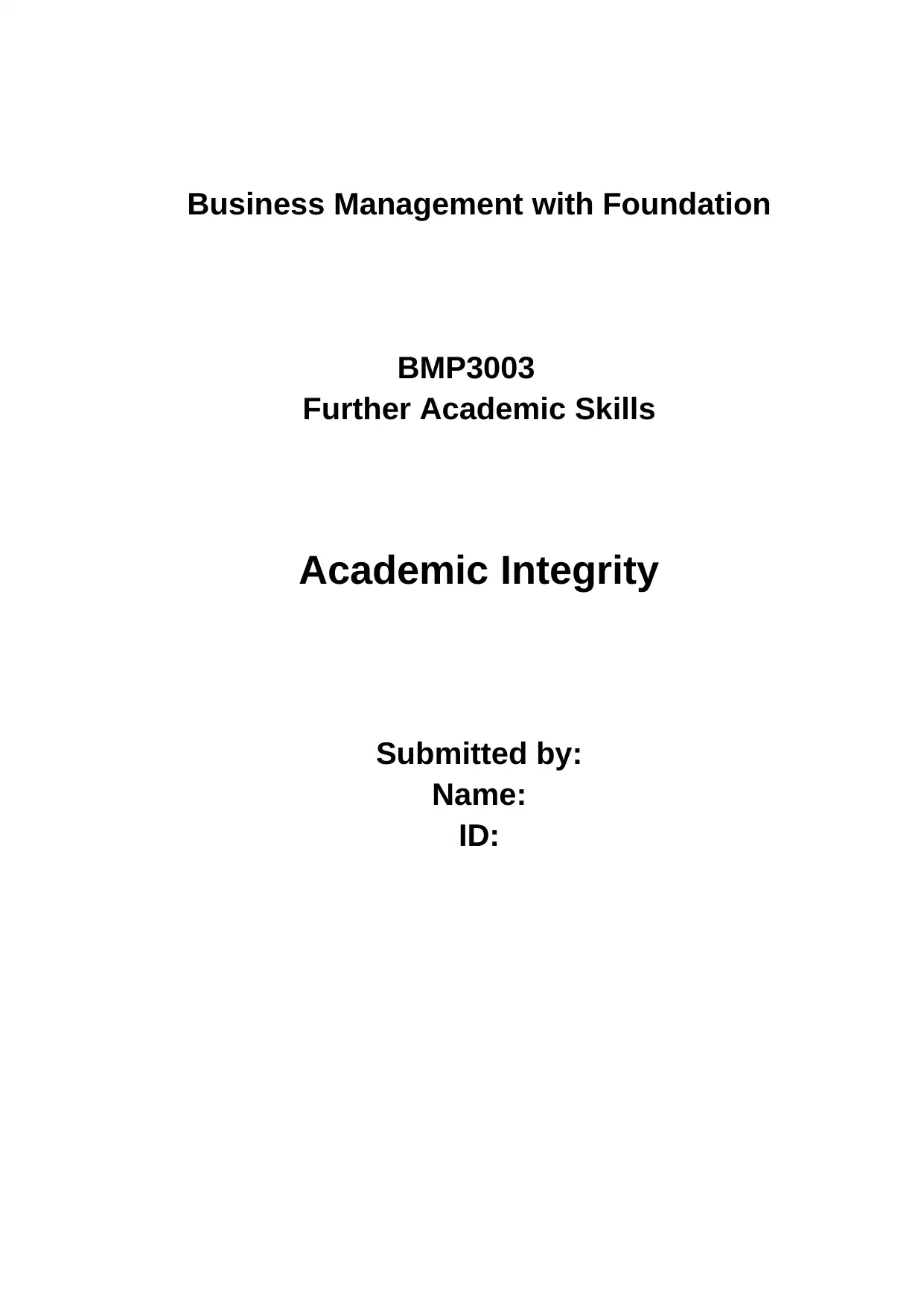
Business Management with Foundation
BMP3003
Further Academic Skills
Academic Integrity
Submitted by:
Name:
ID:
BMP3003
Further Academic Skills
Academic Integrity
Submitted by:
Name:
ID:
Paraphrase This Document
Need a fresh take? Get an instant paraphrase of this document with our AI Paraphraser
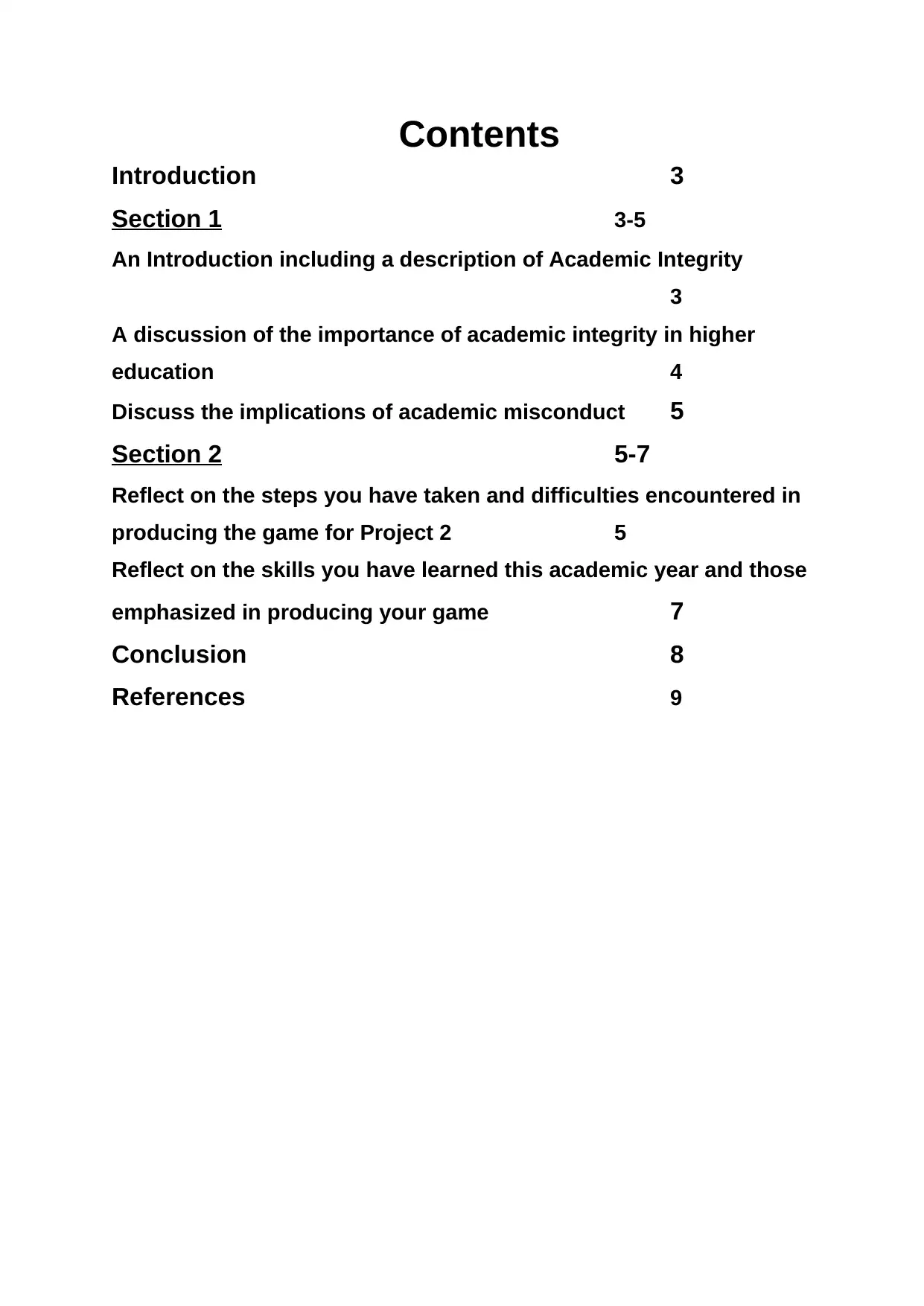
Contents
Introduction 3
Section 1 3-5
An Introduction including a description of Academic Integrity
3
A discussion of the importance of academic integrity in higher
education 4
Discuss the implications of academic misconduct 5
Section 2 5-7
Reflect on the steps you have taken and difficulties encountered in
producing the game for Project 2 5
Reflect on the skills you have learned this academic year and those
emphasized in producing your game 7
Conclusion 8
References 9
Introduction 3
Section 1 3-5
An Introduction including a description of Academic Integrity
3
A discussion of the importance of academic integrity in higher
education 4
Discuss the implications of academic misconduct 5
Section 2 5-7
Reflect on the steps you have taken and difficulties encountered in
producing the game for Project 2 5
Reflect on the skills you have learned this academic year and those
emphasized in producing your game 7
Conclusion 8
References 9
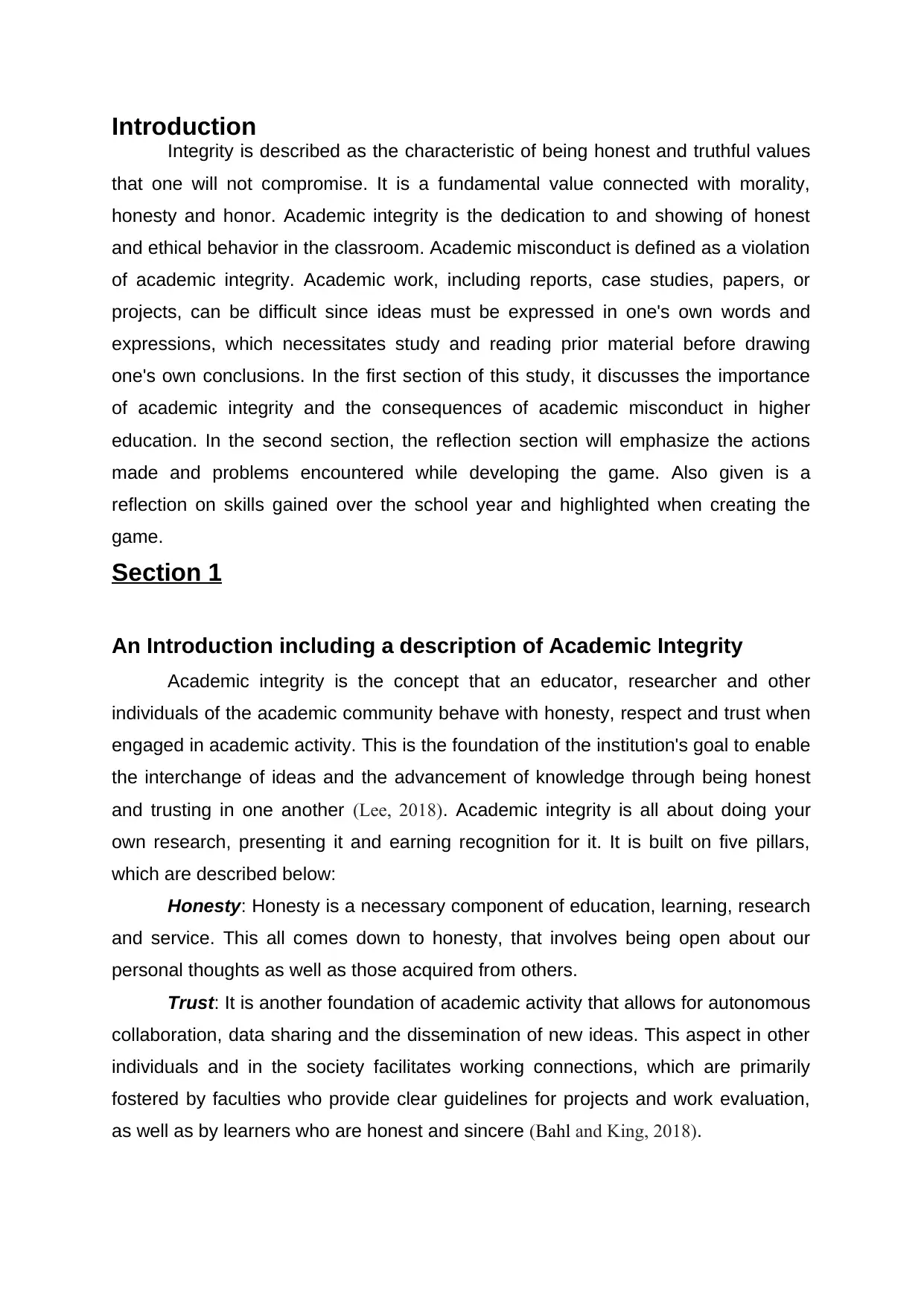
Introduction
Integrity is described as the characteristic of being honest and truthful values
that one will not compromise. It is a fundamental value connected with morality,
honesty and honor. Academic integrity is the dedication to and showing of honest
and ethical behavior in the classroom. Academic misconduct is defined as a violation
of academic integrity. Academic work, including reports, case studies, papers, or
projects, can be difficult since ideas must be expressed in one's own words and
expressions, which necessitates study and reading prior material before drawing
one's own conclusions. In the first section of this study, it discusses the importance
of academic integrity and the consequences of academic misconduct in higher
education. In the second section, the reflection section will emphasize the actions
made and problems encountered while developing the game. Also given is a
reflection on skills gained over the school year and highlighted when creating the
game.
Section 1
An Introduction including a description of Academic Integrity
Academic integrity is the concept that an educator, researcher and other
individuals of the academic community behave with honesty, respect and trust when
engaged in academic activity. This is the foundation of the institution's goal to enable
the interchange of ideas and the advancement of knowledge through being honest
and trusting in one another (Lee, 2018). Academic integrity is all about doing your
own research, presenting it and earning recognition for it. It is built on five pillars,
which are described below:
Honesty: Honesty is a necessary component of education, learning, research
and service. This all comes down to honesty, that involves being open about our
personal thoughts as well as those acquired from others.
Trust: It is another foundation of academic activity that allows for autonomous
collaboration, data sharing and the dissemination of new ideas. This aspect in other
individuals and in the society facilitates working connections, which are primarily
fostered by faculties who provide clear guidelines for projects and work evaluation,
as well as by learners who are honest and sincere (Bahl and King, 2018).
Integrity is described as the characteristic of being honest and truthful values
that one will not compromise. It is a fundamental value connected with morality,
honesty and honor. Academic integrity is the dedication to and showing of honest
and ethical behavior in the classroom. Academic misconduct is defined as a violation
of academic integrity. Academic work, including reports, case studies, papers, or
projects, can be difficult since ideas must be expressed in one's own words and
expressions, which necessitates study and reading prior material before drawing
one's own conclusions. In the first section of this study, it discusses the importance
of academic integrity and the consequences of academic misconduct in higher
education. In the second section, the reflection section will emphasize the actions
made and problems encountered while developing the game. Also given is a
reflection on skills gained over the school year and highlighted when creating the
game.
Section 1
An Introduction including a description of Academic Integrity
Academic integrity is the concept that an educator, researcher and other
individuals of the academic community behave with honesty, respect and trust when
engaged in academic activity. This is the foundation of the institution's goal to enable
the interchange of ideas and the advancement of knowledge through being honest
and trusting in one another (Lee, 2018). Academic integrity is all about doing your
own research, presenting it and earning recognition for it. It is built on five pillars,
which are described below:
Honesty: Honesty is a necessary component of education, learning, research
and service. This all comes down to honesty, that involves being open about our
personal thoughts as well as those acquired from others.
Trust: It is another foundation of academic activity that allows for autonomous
collaboration, data sharing and the dissemination of new ideas. This aspect in other
individuals and in the society facilitates working connections, which are primarily
fostered by faculties who provide clear guidelines for projects and work evaluation,
as well as by learners who are honest and sincere (Bahl and King, 2018).
⊘ This is a preview!⊘
Do you want full access?
Subscribe today to unlock all pages.

Trusted by 1+ million students worldwide
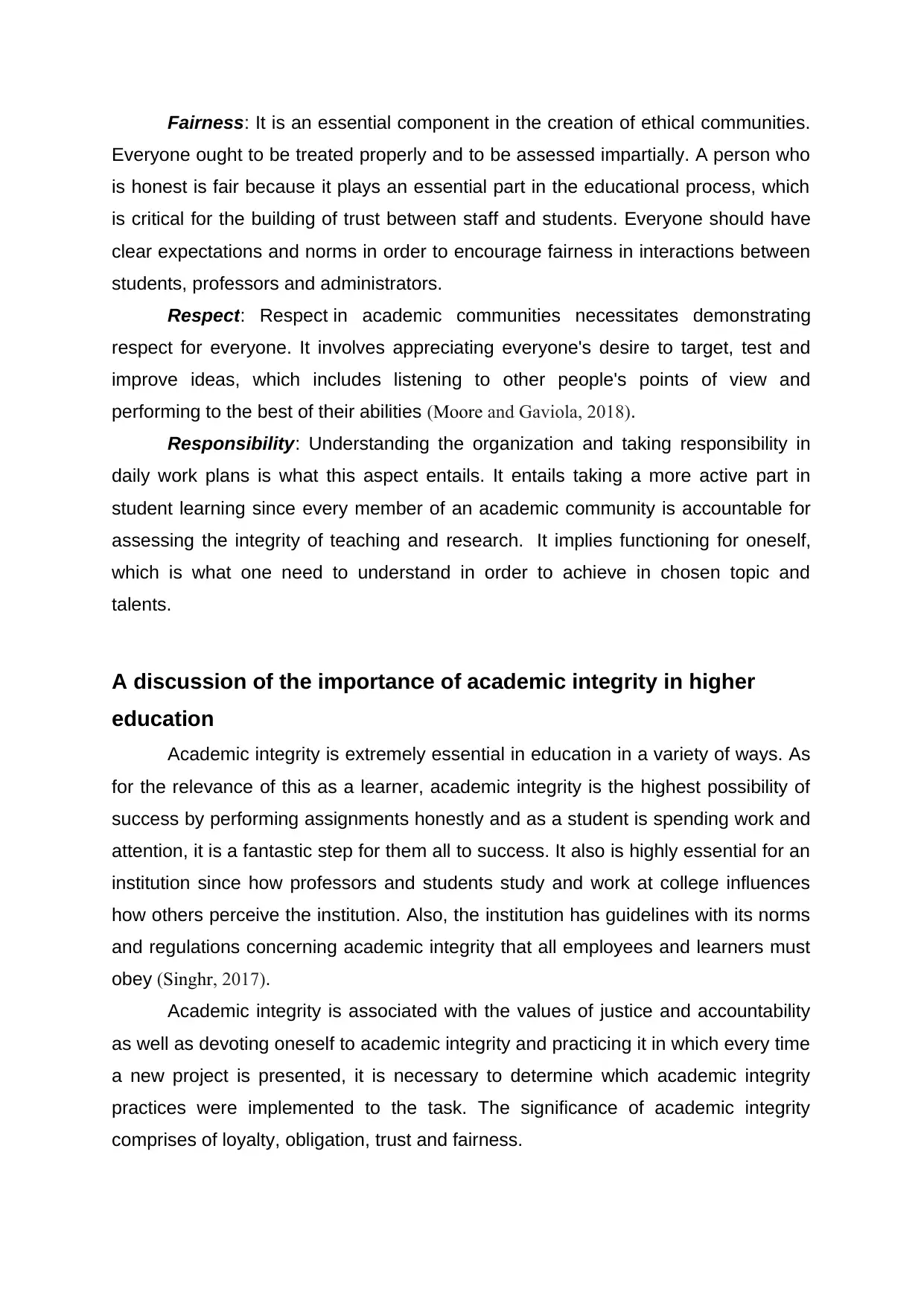
Fairness: It is an essential component in the creation of ethical communities.
Everyone ought to be treated properly and to be assessed impartially. A person who
is honest is fair because it plays an essential part in the educational process, which
is critical for the building of trust between staff and students. Everyone should have
clear expectations and norms in order to encourage fairness in interactions between
students, professors and administrators.
Respect: Respect in academic communities necessitates demonstrating
respect for everyone. It involves appreciating everyone's desire to target, test and
improve ideas, which includes listening to other people's points of view and
performing to the best of their abilities (Moore and Gaviola, 2018).
Responsibility: Understanding the organization and taking responsibility in
daily work plans is what this aspect entails. It entails taking a more active part in
student learning since every member of an academic community is accountable for
assessing the integrity of teaching and research. It implies functioning for oneself,
which is what one need to understand in order to achieve in chosen topic and
talents.
A discussion of the importance of academic integrity in higher
education
Academic integrity is extremely essential in education in a variety of ways. As
for the relevance of this as a learner, academic integrity is the highest possibility of
success by performing assignments honestly and as a student is spending work and
attention, it is a fantastic step for them all to success. It also is highly essential for an
institution since how professors and students study and work at college influences
how others perceive the institution. Also, the institution has guidelines with its norms
and regulations concerning academic integrity that all employees and learners must
obey (Singhr, 2017).
Academic integrity is associated with the values of justice and accountability
as well as devoting oneself to academic integrity and practicing it in which every time
a new project is presented, it is necessary to determine which academic integrity
practices were implemented to the task. The significance of academic integrity
comprises of loyalty, obligation, trust and fairness.
Everyone ought to be treated properly and to be assessed impartially. A person who
is honest is fair because it plays an essential part in the educational process, which
is critical for the building of trust between staff and students. Everyone should have
clear expectations and norms in order to encourage fairness in interactions between
students, professors and administrators.
Respect: Respect in academic communities necessitates demonstrating
respect for everyone. It involves appreciating everyone's desire to target, test and
improve ideas, which includes listening to other people's points of view and
performing to the best of their abilities (Moore and Gaviola, 2018).
Responsibility: Understanding the organization and taking responsibility in
daily work plans is what this aspect entails. It entails taking a more active part in
student learning since every member of an academic community is accountable for
assessing the integrity of teaching and research. It implies functioning for oneself,
which is what one need to understand in order to achieve in chosen topic and
talents.
A discussion of the importance of academic integrity in higher
education
Academic integrity is extremely essential in education in a variety of ways. As
for the relevance of this as a learner, academic integrity is the highest possibility of
success by performing assignments honestly and as a student is spending work and
attention, it is a fantastic step for them all to success. It also is highly essential for an
institution since how professors and students study and work at college influences
how others perceive the institution. Also, the institution has guidelines with its norms
and regulations concerning academic integrity that all employees and learners must
obey (Singhr, 2017).
Academic integrity is associated with the values of justice and accountability
as well as devoting oneself to academic integrity and practicing it in which every time
a new project is presented, it is necessary to determine which academic integrity
practices were implemented to the task. The significance of academic integrity
comprises of loyalty, obligation, trust and fairness.
Paraphrase This Document
Need a fresh take? Get an instant paraphrase of this document with our AI Paraphraser
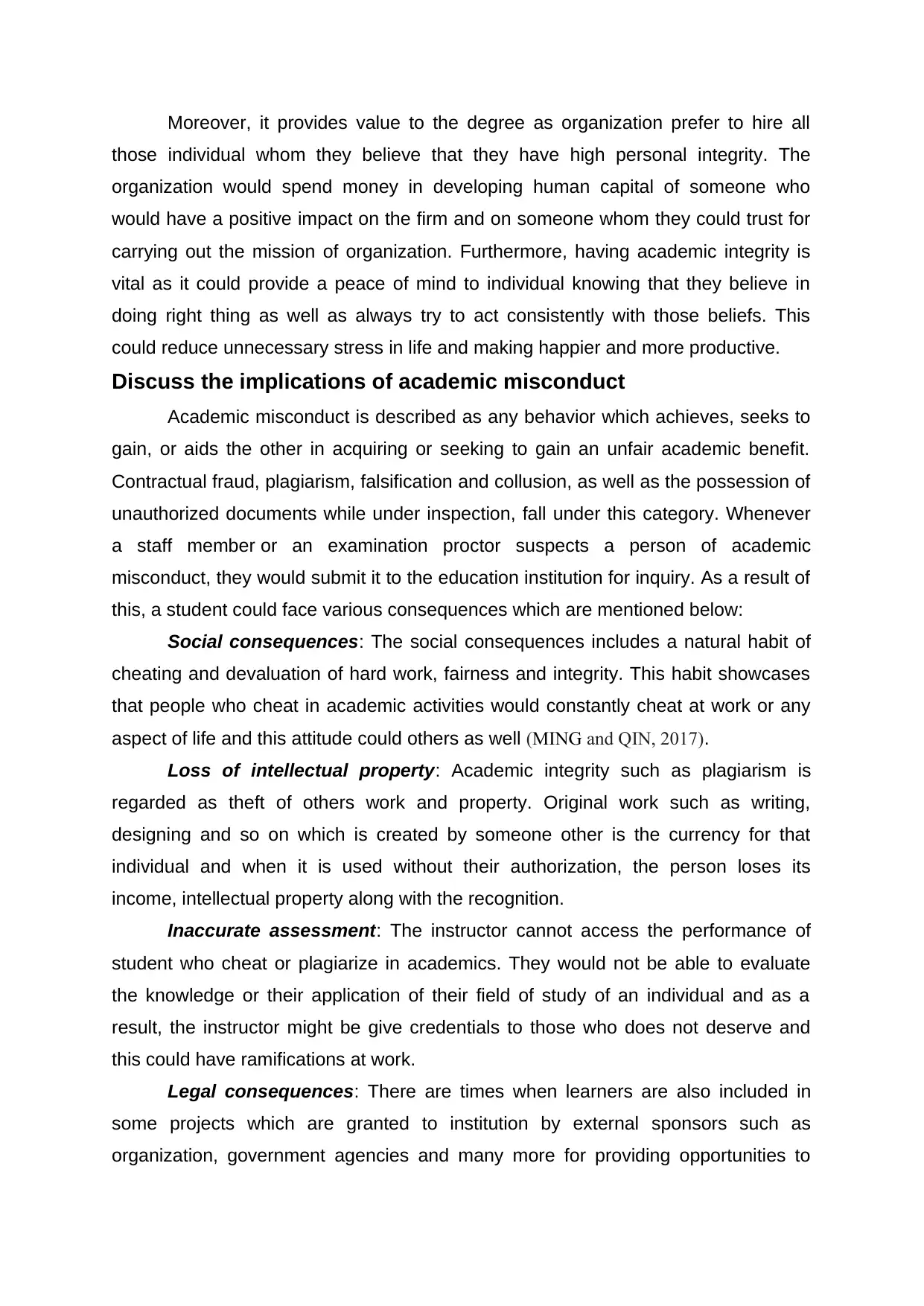
Moreover, it provides value to the degree as organization prefer to hire all
those individual whom they believe that they have high personal integrity. The
organization would spend money in developing human capital of someone who
would have a positive impact on the firm and on someone whom they could trust for
carrying out the mission of organization. Furthermore, having academic integrity is
vital as it could provide a peace of mind to individual knowing that they believe in
doing right thing as well as always try to act consistently with those beliefs. This
could reduce unnecessary stress in life and making happier and more productive.
Discuss the implications of academic misconduct
Academic misconduct is described as any behavior which achieves, seeks to
gain, or aids the other in acquiring or seeking to gain an unfair academic benefit.
Contractual fraud, plagiarism, falsification and collusion, as well as the possession of
unauthorized documents while under inspection, fall under this category. Whenever
a staff member or an examination proctor suspects a person of academic
misconduct, they would submit it to the education institution for inquiry. As a result of
this, a student could face various consequences which are mentioned below:
Social consequences: The social consequences includes a natural habit of
cheating and devaluation of hard work, fairness and integrity. This habit showcases
that people who cheat in academic activities would constantly cheat at work or any
aspect of life and this attitude could others as well (MING and QIN, 2017).
Loss of intellectual property: Academic integrity such as plagiarism is
regarded as theft of others work and property. Original work such as writing,
designing and so on which is created by someone other is the currency for that
individual and when it is used without their authorization, the person loses its
income, intellectual property along with the recognition.
Inaccurate assessment: The instructor cannot access the performance of
student who cheat or plagiarize in academics. They would not be able to evaluate
the knowledge or their application of their field of study of an individual and as a
result, the instructor might be give credentials to those who does not deserve and
this could have ramifications at work.
Legal consequences: There are times when learners are also included in
some projects which are granted to institution by external sponsors such as
organization, government agencies and many more for providing opportunities to
those individual whom they believe that they have high personal integrity. The
organization would spend money in developing human capital of someone who
would have a positive impact on the firm and on someone whom they could trust for
carrying out the mission of organization. Furthermore, having academic integrity is
vital as it could provide a peace of mind to individual knowing that they believe in
doing right thing as well as always try to act consistently with those beliefs. This
could reduce unnecessary stress in life and making happier and more productive.
Discuss the implications of academic misconduct
Academic misconduct is described as any behavior which achieves, seeks to
gain, or aids the other in acquiring or seeking to gain an unfair academic benefit.
Contractual fraud, plagiarism, falsification and collusion, as well as the possession of
unauthorized documents while under inspection, fall under this category. Whenever
a staff member or an examination proctor suspects a person of academic
misconduct, they would submit it to the education institution for inquiry. As a result of
this, a student could face various consequences which are mentioned below:
Social consequences: The social consequences includes a natural habit of
cheating and devaluation of hard work, fairness and integrity. This habit showcases
that people who cheat in academic activities would constantly cheat at work or any
aspect of life and this attitude could others as well (MING and QIN, 2017).
Loss of intellectual property: Academic integrity such as plagiarism is
regarded as theft of others work and property. Original work such as writing,
designing and so on which is created by someone other is the currency for that
individual and when it is used without their authorization, the person loses its
income, intellectual property along with the recognition.
Inaccurate assessment: The instructor cannot access the performance of
student who cheat or plagiarize in academics. They would not be able to evaluate
the knowledge or their application of their field of study of an individual and as a
result, the instructor might be give credentials to those who does not deserve and
this could have ramifications at work.
Legal consequences: There are times when learners are also included in
some projects which are granted to institution by external sponsors such as
organization, government agencies and many more for providing opportunities to
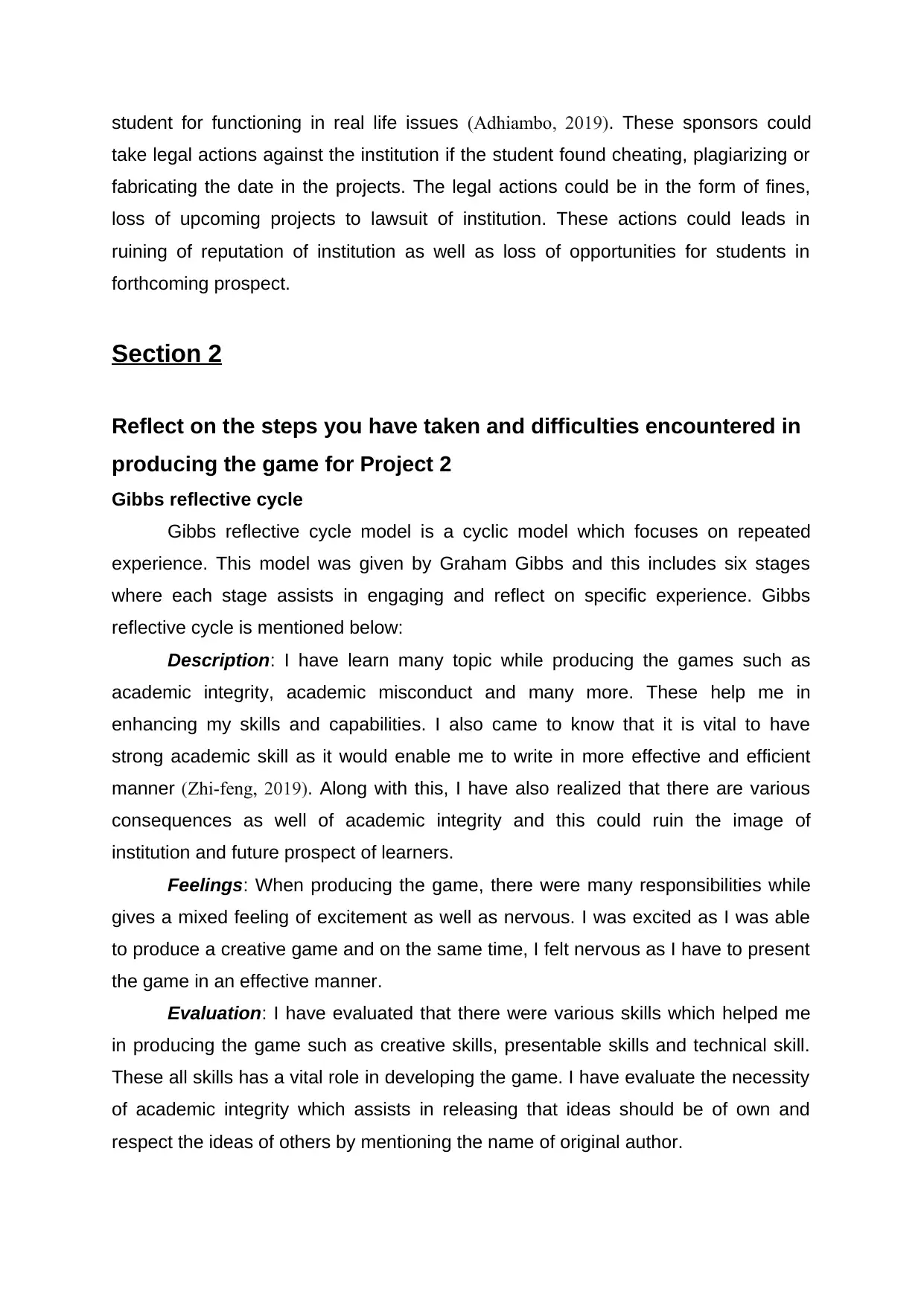
student for functioning in real life issues (Adhiambo, 2019). These sponsors could
take legal actions against the institution if the student found cheating, plagiarizing or
fabricating the date in the projects. The legal actions could be in the form of fines,
loss of upcoming projects to lawsuit of institution. These actions could leads in
ruining of reputation of institution as well as loss of opportunities for students in
forthcoming prospect.
Section 2
Reflect on the steps you have taken and difficulties encountered in
producing the game for Project 2
Gibbs reflective cycle
Gibbs reflective cycle model is a cyclic model which focuses on repeated
experience. This model was given by Graham Gibbs and this includes six stages
where each stage assists in engaging and reflect on specific experience. Gibbs
reflective cycle is mentioned below:
Description: I have learn many topic while producing the games such as
academic integrity, academic misconduct and many more. These help me in
enhancing my skills and capabilities. I also came to know that it is vital to have
strong academic skill as it would enable me to write in more effective and efficient
manner (Zhi-feng, 2019). Along with this, I have also realized that there are various
consequences as well of academic integrity and this could ruin the image of
institution and future prospect of learners.
Feelings: When producing the game, there were many responsibilities while
gives a mixed feeling of excitement as well as nervous. I was excited as I was able
to produce a creative game and on the same time, I felt nervous as I have to present
the game in an effective manner.
Evaluation: I have evaluated that there were various skills which helped me
in producing the game such as creative skills, presentable skills and technical skill.
These all skills has a vital role in developing the game. I have evaluate the necessity
of academic integrity which assists in releasing that ideas should be of own and
respect the ideas of others by mentioning the name of original author.
take legal actions against the institution if the student found cheating, plagiarizing or
fabricating the date in the projects. The legal actions could be in the form of fines,
loss of upcoming projects to lawsuit of institution. These actions could leads in
ruining of reputation of institution as well as loss of opportunities for students in
forthcoming prospect.
Section 2
Reflect on the steps you have taken and difficulties encountered in
producing the game for Project 2
Gibbs reflective cycle
Gibbs reflective cycle model is a cyclic model which focuses on repeated
experience. This model was given by Graham Gibbs and this includes six stages
where each stage assists in engaging and reflect on specific experience. Gibbs
reflective cycle is mentioned below:
Description: I have learn many topic while producing the games such as
academic integrity, academic misconduct and many more. These help me in
enhancing my skills and capabilities. I also came to know that it is vital to have
strong academic skill as it would enable me to write in more effective and efficient
manner (Zhi-feng, 2019). Along with this, I have also realized that there are various
consequences as well of academic integrity and this could ruin the image of
institution and future prospect of learners.
Feelings: When producing the game, there were many responsibilities while
gives a mixed feeling of excitement as well as nervous. I was excited as I was able
to produce a creative game and on the same time, I felt nervous as I have to present
the game in an effective manner.
Evaluation: I have evaluated that there were various skills which helped me
in producing the game such as creative skills, presentable skills and technical skill.
These all skills has a vital role in developing the game. I have evaluate the necessity
of academic integrity which assists in releasing that ideas should be of own and
respect the ideas of others by mentioning the name of original author.
⊘ This is a preview!⊘
Do you want full access?
Subscribe today to unlock all pages.

Trusted by 1+ million students worldwide
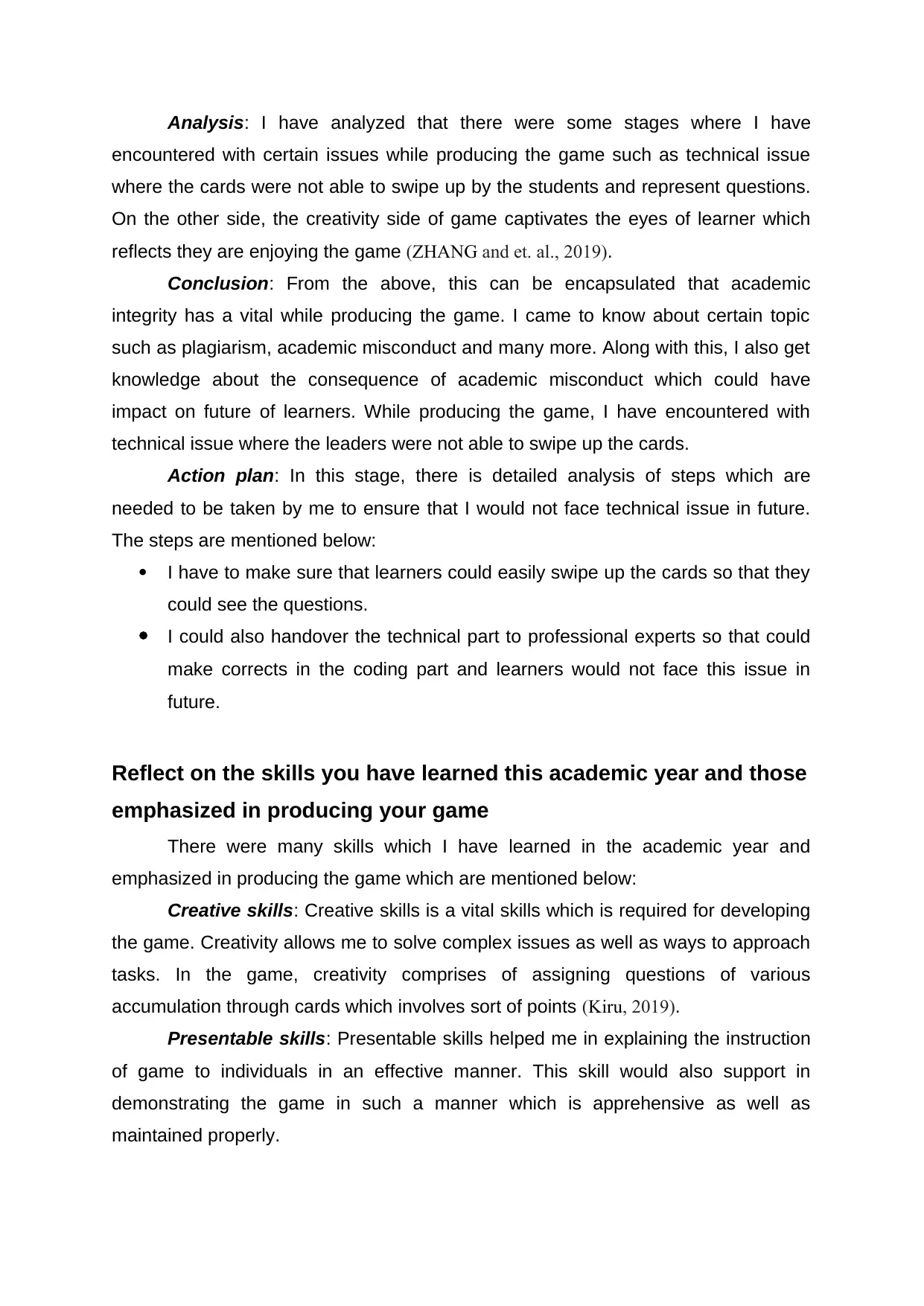
Analysis: I have analyzed that there were some stages where I have
encountered with certain issues while producing the game such as technical issue
where the cards were not able to swipe up by the students and represent questions.
On the other side, the creativity side of game captivates the eyes of learner which
reflects they are enjoying the game (ZHANG and et. al., 2019).
Conclusion: From the above, this can be encapsulated that academic
integrity has a vital while producing the game. I came to know about certain topic
such as plagiarism, academic misconduct and many more. Along with this, I also get
knowledge about the consequence of academic misconduct which could have
impact on future of learners. While producing the game, I have encountered with
technical issue where the leaders were not able to swipe up the cards.
Action plan: In this stage, there is detailed analysis of steps which are
needed to be taken by me to ensure that I would not face technical issue in future.
The steps are mentioned below:
I have to make sure that learners could easily swipe up the cards so that they
could see the questions.
I could also handover the technical part to professional experts so that could
make corrects in the coding part and learners would not face this issue in
future.
Reflect on the skills you have learned this academic year and those
emphasized in producing your game
There were many skills which I have learned in the academic year and
emphasized in producing the game which are mentioned below:
Creative skills: Creative skills is a vital skills which is required for developing
the game. Creativity allows me to solve complex issues as well as ways to approach
tasks. In the game, creativity comprises of assigning questions of various
accumulation through cards which involves sort of points (Kiru, 2019).
Presentable skills: Presentable skills helped me in explaining the instruction
of game to individuals in an effective manner. This skill would also support in
demonstrating the game in such a manner which is apprehensive as well as
maintained properly.
encountered with certain issues while producing the game such as technical issue
where the cards were not able to swipe up by the students and represent questions.
On the other side, the creativity side of game captivates the eyes of learner which
reflects they are enjoying the game (ZHANG and et. al., 2019).
Conclusion: From the above, this can be encapsulated that academic
integrity has a vital while producing the game. I came to know about certain topic
such as plagiarism, academic misconduct and many more. Along with this, I also get
knowledge about the consequence of academic misconduct which could have
impact on future of learners. While producing the game, I have encountered with
technical issue where the leaders were not able to swipe up the cards.
Action plan: In this stage, there is detailed analysis of steps which are
needed to be taken by me to ensure that I would not face technical issue in future.
The steps are mentioned below:
I have to make sure that learners could easily swipe up the cards so that they
could see the questions.
I could also handover the technical part to professional experts so that could
make corrects in the coding part and learners would not face this issue in
future.
Reflect on the skills you have learned this academic year and those
emphasized in producing your game
There were many skills which I have learned in the academic year and
emphasized in producing the game which are mentioned below:
Creative skills: Creative skills is a vital skills which is required for developing
the game. Creativity allows me to solve complex issues as well as ways to approach
tasks. In the game, creativity comprises of assigning questions of various
accumulation through cards which involves sort of points (Kiru, 2019).
Presentable skills: Presentable skills helped me in explaining the instruction
of game to individuals in an effective manner. This skill would also support in
demonstrating the game in such a manner which is apprehensive as well as
maintained properly.
Paraphrase This Document
Need a fresh take? Get an instant paraphrase of this document with our AI Paraphraser
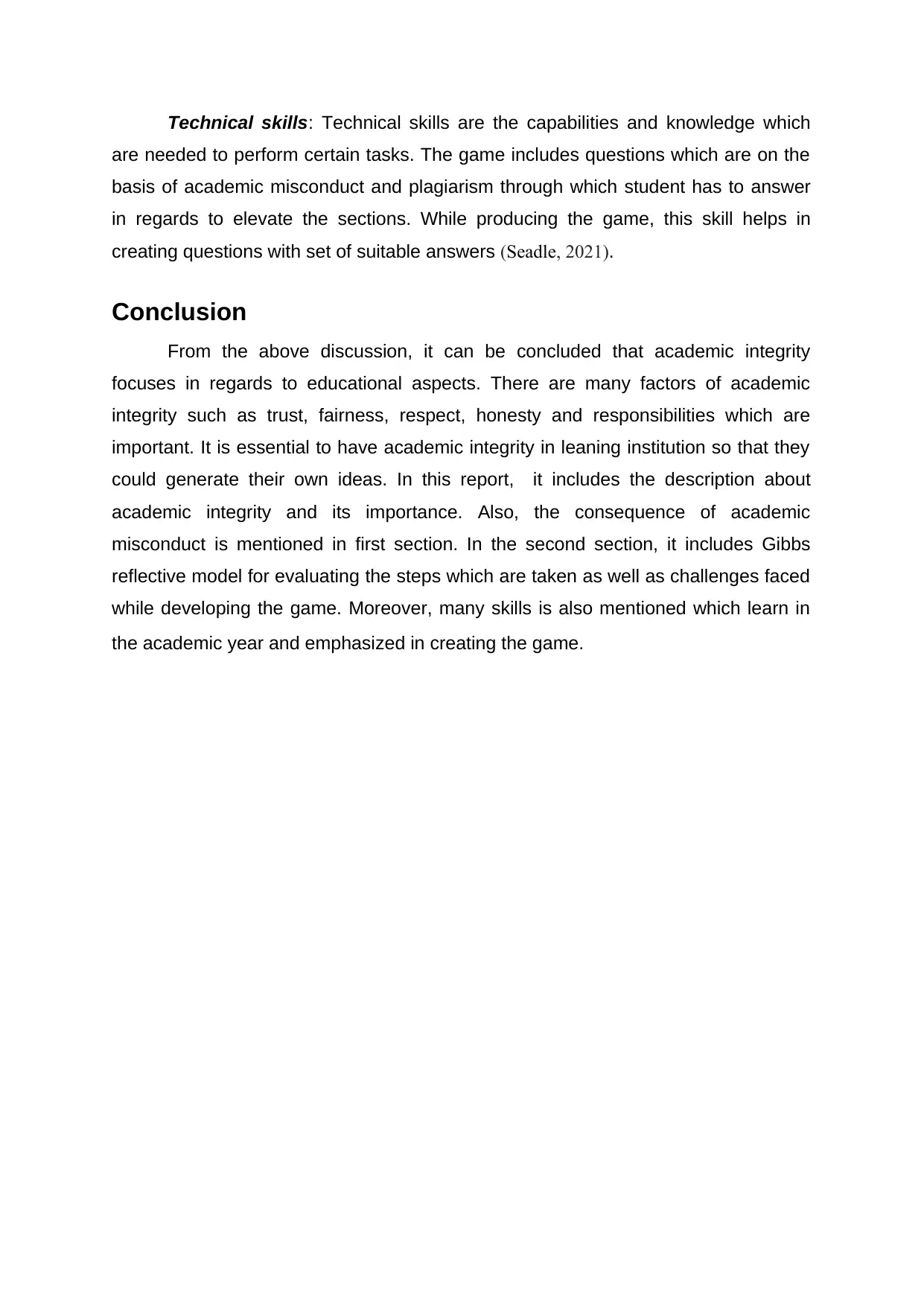
Technical skills: Technical skills are the capabilities and knowledge which
are needed to perform certain tasks. The game includes questions which are on the
basis of academic misconduct and plagiarism through which student has to answer
in regards to elevate the sections. While producing the game, this skill helps in
creating questions with set of suitable answers (Seadle, 2021).
Conclusion
From the above discussion, it can be concluded that academic integrity
focuses in regards to educational aspects. There are many factors of academic
integrity such as trust, fairness, respect, honesty and responsibilities which are
important. It is essential to have academic integrity in leaning institution so that they
could generate their own ideas. In this report, it includes the description about
academic integrity and its importance. Also, the consequence of academic
misconduct is mentioned in first section. In the second section, it includes Gibbs
reflective model for evaluating the steps which are taken as well as challenges faced
while developing the game. Moreover, many skills is also mentioned which learn in
the academic year and emphasized in creating the game.
are needed to perform certain tasks. The game includes questions which are on the
basis of academic misconduct and plagiarism through which student has to answer
in regards to elevate the sections. While producing the game, this skill helps in
creating questions with set of suitable answers (Seadle, 2021).
Conclusion
From the above discussion, it can be concluded that academic integrity
focuses in regards to educational aspects. There are many factors of academic
integrity such as trust, fairness, respect, honesty and responsibilities which are
important. It is essential to have academic integrity in leaning institution so that they
could generate their own ideas. In this report, it includes the description about
academic integrity and its importance. Also, the consequence of academic
misconduct is mentioned in first section. In the second section, it includes Gibbs
reflective model for evaluating the steps which are taken as well as challenges faced
while developing the game. Moreover, many skills is also mentioned which learn in
the academic year and emphasized in creating the game.

References
Adhiambo, V. R., 2019. The Connection between Academic and Professional Integrity: A
Review.
East African Journal of Interdisciplinary Studies, 1(1), pp.12-31.
Bahl, R. and King, M., 2018. What's wrong with Western civilisation anyway?: The story of
the VC, the donor, academic integrity and the union.
Advocate: Journal of the
National Tertiary Education Union, 25(2), pp.28-29.
Kiru, R. S., 2019. Integrity in the Educational Environment.
Journal of Education Studies
(JES).
Lee, A. W. S., 2018. Academic Integrity in the Humanities and Cultural Studies: A Mediated
Learning Trail.
Journal on Excellence in College Teaching,
29, pp.73-95.
MING, J. and QIN, F., 2017. Discussion on the Exertion of University Library's Function in
Academic Integrity Education.
Journal of Library and Information Science, p.11.
Moore, H. A. and Gaviola, M. S., 2018. Engaging nursing students in a culture of
integrity.
Journal of Nursing Education, 57(4), pp.237-239.
Seadle, M., 2021.
The Measurement of Information Integrity. Routledge.
Singhr, A., 2017. Plagiarism: Infringement of Academic Integrity.
International Journal of
Research in Social Sciences,
7(9), pp.375-379.
ZHANG and et. al., 2019. Investigation and analysis on the status quo of education and
management on research integrity: Taking hospitals, medical colleges and medical
research institutes for example.
Chinese Journal of Medical Science Research
Management, pp.321-324.
Zhi-feng, C. H. E. N., 2019. Research on Integrity Problems among College Students under
the Background of" Ten Systems for Student Education" in the New Era and
Countermeasures——Based on the Survey of College Students in Taizhou City,
Jiangsu Province.
Journal of Anhui Business College.
Adhiambo, V. R., 2019. The Connection between Academic and Professional Integrity: A
Review.
East African Journal of Interdisciplinary Studies, 1(1), pp.12-31.
Bahl, R. and King, M., 2018. What's wrong with Western civilisation anyway?: The story of
the VC, the donor, academic integrity and the union.
Advocate: Journal of the
National Tertiary Education Union, 25(2), pp.28-29.
Kiru, R. S., 2019. Integrity in the Educational Environment.
Journal of Education Studies
(JES).
Lee, A. W. S., 2018. Academic Integrity in the Humanities and Cultural Studies: A Mediated
Learning Trail.
Journal on Excellence in College Teaching,
29, pp.73-95.
MING, J. and QIN, F., 2017. Discussion on the Exertion of University Library's Function in
Academic Integrity Education.
Journal of Library and Information Science, p.11.
Moore, H. A. and Gaviola, M. S., 2018. Engaging nursing students in a culture of
integrity.
Journal of Nursing Education, 57(4), pp.237-239.
Seadle, M., 2021.
The Measurement of Information Integrity. Routledge.
Singhr, A., 2017. Plagiarism: Infringement of Academic Integrity.
International Journal of
Research in Social Sciences,
7(9), pp.375-379.
ZHANG and et. al., 2019. Investigation and analysis on the status quo of education and
management on research integrity: Taking hospitals, medical colleges and medical
research institutes for example.
Chinese Journal of Medical Science Research
Management, pp.321-324.
Zhi-feng, C. H. E. N., 2019. Research on Integrity Problems among College Students under
the Background of" Ten Systems for Student Education" in the New Era and
Countermeasures——Based on the Survey of College Students in Taizhou City,
Jiangsu Province.
Journal of Anhui Business College.
⊘ This is a preview!⊘
Do you want full access?
Subscribe today to unlock all pages.

Trusted by 1+ million students worldwide
1 out of 9
Related Documents
Your All-in-One AI-Powered Toolkit for Academic Success.
+13062052269
info@desklib.com
Available 24*7 on WhatsApp / Email
![[object Object]](/_next/static/media/star-bottom.7253800d.svg)
Unlock your academic potential
Copyright © 2020–2025 A2Z Services. All Rights Reserved. Developed and managed by ZUCOL.

